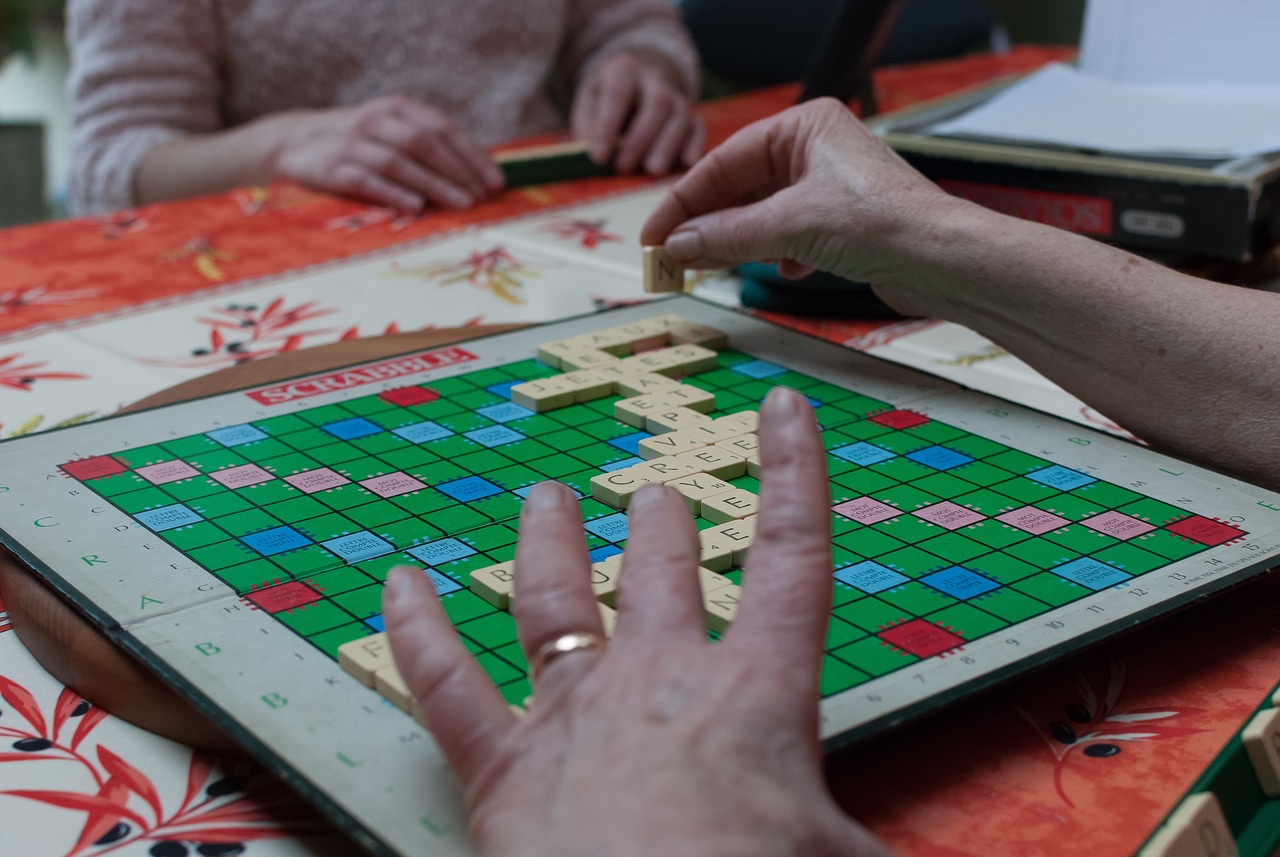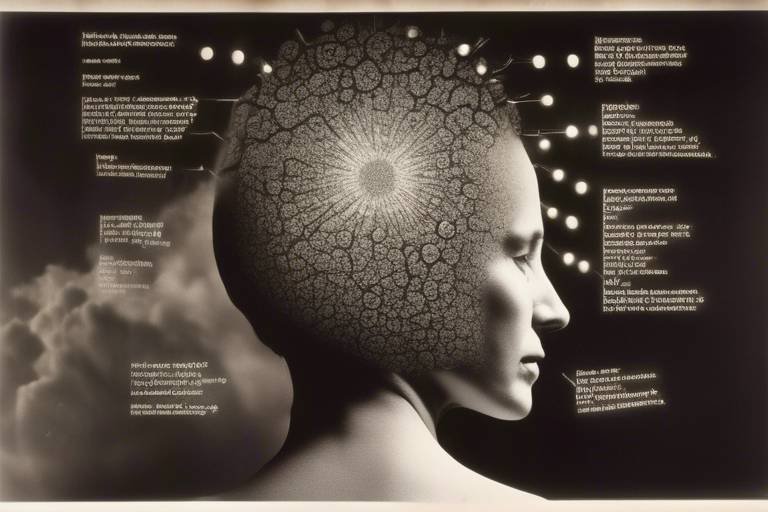Unleashing the Power of the Human Mind
Have you ever stopped to think about the incredible capabilities of your own mind? It’s like a supercomputer, constantly processing information, solving problems, and creating new ideas. The human mind is a vast, unexplored frontier filled with potential, waiting for us to unlock its secrets. In this article, we’ll dive deep into the extraordinary powers of creativity, problem-solving, and emotional intelligence, and explore how we can harness these abilities to improve our lives. Imagine being able to tap into your mind's full potential—what would you achieve? The possibilities are endless!
Let’s kick things off with a fascinating concept: neuroplasticity. This is the brain's remarkable ability to reorganize itself by forming new neural connections throughout life. Think of it as your brain's way of adapting to new experiences, learning, and even recovering from injuries. When you understand neuroplasticity, you empower yourself to enhance your cognitive abilities. Whether you’re trying to learn a new skill or recover from trauma, embracing this concept can be a game changer. It’s like having a reset button for your brain!
Now, let’s talk about mindfulness. In our fast-paced world, it’s easy to get lost in the chaos of daily life. Mindfulness practices promote awareness and focus, acting as a compass to guide us back to the present moment. By incorporating mindfulness techniques into our daily routines, we can achieve better mental clarity and emotional regulation. Imagine sitting quietly for just a few minutes each day, focusing on your breath—this simple practice can lead to profound changes in how you perceive the world. It’s like polishing a mirror to reflect your true self!
One of the most effective ways to reshape our thinking is through Cognitive Behavioral Therapy (CBT) techniques. These practical methods help us identify and challenge negative thought patterns that hold us back. By recognizing these thoughts, we can replace them with more constructive ones, paving the way for personal growth and emotional resilience. It’s like training your brain to run a marathon instead of a sprint—slow, steady progress leads to lasting change!
Another powerful tool for self-discovery is journaling. Keeping a journal allows us to reflect on our thoughts and feelings, providing clarity and insight into our emotional landscapes. When we write, we create a space for self-reflection, which can enhance our self-awareness. It’s like having a conversation with yourself—one where you can explore your innermost thoughts without judgment. So, grab a pen and start your journey of self-exploration!
Have you ever heard of visualization techniques? They can be incredibly effective in enhancing performance and motivation. By picturing our goals in vivid detail, we can create a mental roadmap to success. Think of it as rehearsing for a big performance—when you visualize yourself achieving your goals, you’re not just dreaming; you’re training your mind to make it happen. So close your eyes, and see yourself crossing that finish line!
Cultivating creativity is essential for problem-solving and innovation. But how do you unlock that creative potential? There are various strategies to overcome mental blocks, such as changing your environment, seeking inspiration from different sources, or even engaging in playful activities. Creativity thrives when we allow ourselves to think outside the box. It’s like watering a plant; the more you nurture it, the more it flourishes!
Emotional intelligence (EI) is another crucial aspect of harnessing the power of the mind. EI encompasses our ability to understand and manage our emotions, as well as the emotions of others. This skill plays a significant role in personal and professional success. By enhancing our emotional understanding and empathy, we can improve our relationships and communication. Just think about it: when you understand your emotions, you can navigate life’s challenges with grace and poise.
Developing emotional intelligence leads to better interpersonal relationships. When we apply EI principles, we enhance our ability to connect with others on a deeper level. This connection fosters trust and understanding, making it easier to communicate effectively. It’s like building a bridge between two islands—stronger connections lead to smoother interactions and a more harmonious life.
Understanding and managing stress is vital for maintaining mental health. Recognizing stressors and implementing coping strategies can help us maintain balance and well-being. Techniques such as deep breathing, exercise, and time management can significantly reduce stress levels. Think of stress management as a toolkit—each tool serves a purpose, helping you build a resilient foundation for a healthier mind!
As we look to the future, the field of mind empowerment is evolving rapidly. Advancements in technology and psychology are paving the way for new methods to enhance human cognitive abilities. From brain-training apps to virtual reality experiences, the future is bright for those eager to explore the depths of their minds. Imagine a world where we can unlock our full potential with just a few clicks—exciting, right?
- What is neuroplasticity? Neuroplasticity refers to the brain's ability to reorganize itself by forming new neural connections throughout life.
- How can I practice mindfulness? Mindfulness can be practiced through techniques such as meditation, focused breathing, and mindful observation of your surroundings.
- What are some benefits of journaling? Journaling enhances self-awareness, emotional processing, and can provide clarity of thought.
- How does emotional intelligence affect relationships? Higher emotional intelligence leads to better communication, empathy, and stronger interpersonal connections.
- What are effective stress management techniques? Techniques include deep breathing, exercise, time management, and engaging in hobbies.

The Science of Neuroplasticity
Neuroplasticity is a fascinating concept that reveals the brain's remarkable ability to adapt and reorganize itself throughout our lives. Imagine your brain as a highly flexible network of pathways, constantly reshaping itself based on your experiences, thoughts, and emotions. It’s like a bustling city where new roads are built, and old ones are repurposed, depending on the traffic patterns of daily life. This adaptability not only allows us to learn new skills but also plays a vital role in recovery from injuries and trauma.
To fully grasp the power of neuroplasticity, let’s break it down into a few key points:
- Formation of New Neural Connections: Every time you learn something new, your brain creates new connections between neurons. This is similar to planting seeds in a garden; with time and care, those seeds grow into flourishing plants representing your knowledge and skills.
- Recovery from Injury: Neuroplasticity is crucial for individuals recovering from brain injuries. The brain can often reroute functions to undamaged areas, allowing for rehabilitation and improvement.
- Changing Habits: The brain’s plasticity means that even deeply ingrained habits can be altered. By consciously practicing new behaviors, you can effectively rewire your brain, making positive changes a reality.
Research in neuroscience has shown that engaging in activities that challenge the brain, such as learning a new language or instrument, can significantly enhance cognitive abilities. Think of your brain as a muscle; the more you exercise it, the stronger it becomes. Activities that promote neuroplasticity include:
- Mental exercises like puzzles and memory games
- Physical exercises that increase blood flow to the brain
- Mindfulness and meditation practices that enhance focus and awareness
In essence, neuroplasticity empowers us to take charge of our cognitive health. Whether you’re looking to boost your memory, recover from a setback, or simply enhance your mental agility, understanding and leveraging neuroplasticity can be a game-changer. The key takeaway is that you have the ability to mold your brain's structure and function through conscious effort and practice.
As we continue to explore the incredible capabilities of the human mind, it becomes clear that embracing the science of neuroplasticity is not just about understanding how our brains work; it's about actively participating in their evolution. So, why not start today? Take a moment to engage in a new activity or practice mindfulness, and watch as your brain responds with newfound strength and resilience.
Q1: What is neuroplasticity?
A1: Neuroplasticity is the brain's ability to reorganize itself by forming new neural connections throughout life, allowing for learning, recovery from injury, and habit change.
Q2: How can I enhance neuroplasticity?
A2: Engaging in mentally stimulating activities, physical exercise, and mindfulness practices can help enhance neuroplasticity and improve cognitive function.
Q3: Is neuroplasticity only beneficial for recovery from brain injuries?
A3: No, neuroplasticity is beneficial for everyone. It allows for continual learning and adaptation, making it essential for personal growth and skill development.

The Role of Mindfulness
Mindfulness is more than just a trendy buzzword; it's a powerful practice that can transform your mental landscape. Imagine being able to tune out the noise of everyday life and focus solely on the present moment. Sounds appealing, right? Well, that's what mindfulness offers. By cultivating this state of awareness, individuals can enhance their mental clarity and emotional regulation, leading to a more balanced and fulfilling life.
At its core, mindfulness involves paying attention to your thoughts, feelings, and sensations without judgment. It's like being an observer of your own life, allowing you to respond to situations more thoughtfully rather than react impulsively. This practice has roots in ancient meditation traditions, but recent studies have shown its profound impact on mental health, making it a valuable tool for modern living.
So, how can you incorporate mindfulness into your daily routine? Here are some practical techniques:
- Mindful Breathing: Take a few minutes each day to focus on your breath. Inhale deeply through your nose, hold for a moment, and exhale slowly through your mouth. This simple practice can ground you and reduce anxiety.
- Body Scan: Lie down comfortably and mentally scan your body from head to toe. Notice any tension or discomfort, and consciously relax those areas. This technique promotes body awareness and relaxation.
- Mindful Eating: Turn your meals into a mindful experience. Focus on the taste, texture, and aroma of your food. This not only enhances your enjoyment but also helps you develop a healthier relationship with eating.
Incorporating mindfulness doesn't require hours of spare time. Even small moments can make a difference. For instance, while waiting for your coffee to brew, take a moment to notice the aroma and warmth of the cup in your hands. These simple practices can help cultivate a sense of presence and appreciation in your life.
Moreover, the benefits of mindfulness extend beyond personal well-being. Research has shown that practicing mindfulness can improve emotional intelligence, enhance focus, and even boost creativity. By fostering a mindset of awareness, you can navigate challenges with greater ease and clarity.
In a world filled with distractions, mindfulness serves as a beacon of light, guiding us back to what truly matters. It empowers us to connect with ourselves and others on a deeper level, promoting empathy and understanding. As you embark on your mindfulness journey, remember that it's not about perfection; it's about progress. Each moment of awareness is a step toward a more mindful and fulfilling life.
Q: What is mindfulness?
A: Mindfulness is the practice of being fully present and engaged in the moment, without judgment. It involves observing your thoughts and feelings as they arise.
Q: How can mindfulness improve my mental health?
A: Mindfulness can reduce stress, anxiety, and depression by helping you manage your thoughts and emotions more effectively. It promotes emotional regulation and enhances overall well-being.
Q: Do I need to meditate to practice mindfulness?
A: While meditation is a common mindfulness practice, you can incorporate mindfulness into everyday activities, such as eating, walking, or even washing dishes.
Q: How long should I practice mindfulness each day?
A: Even a few minutes of mindfulness practice can be beneficial. Start with short sessions and gradually increase the duration as you become more comfortable with the practice.

Cognitive Behavioral Techniques
Cognitive Behavioral Therapy (CBT) is a transformative approach that can significantly reshape how we think and respond to the world around us. At its core, CBT is based on the idea that our thoughts, feelings, and behaviors are interconnected. By identifying and altering negative thought patterns, we can foster a more positive and productive mindset. Imagine your mind as a garden; if you allow weeds (negative thoughts) to take over, they will choke out the flowers (positive thoughts). By using CBT techniques, you can effectively prune those weeds and cultivate a flourishing garden of positivity.
One of the most effective CBT techniques is cognitive restructuring. This involves identifying distorted thinking patterns, such as catastrophizing or all-or-nothing thinking, and challenging them. For instance, if you find yourself thinking, "I always mess things up," you can counter this by reminding yourself of past successes and acknowledging that everyone makes mistakes. This practice not only helps in reducing anxiety but also builds resilience.
Another powerful technique is behavioral activation. This method encourages individuals to engage in activities that bring joy and fulfillment. When we're feeling low, we often withdraw from activities we once enjoyed, which can create a vicious cycle of negativity. By consciously planning enjoyable activities, we can break this cycle and boost our mood. Think of it as charging your phone; just like a battery needs power to function, our minds need positive experiences to thrive.
Additionally, exposure therapy is a valuable CBT technique for dealing with anxiety. This approach involves gradually exposing oneself to feared situations in a controlled manner. For example, if someone has a fear of public speaking, they might start by speaking in front of a mirror, then progress to a small group of friends, and eventually to a larger audience. This gradual exposure helps desensitize the individual to the fear, making it more manageable over time.
To effectively implement these techniques, it's essential to keep track of your progress. Maintaining a thought diary can be incredibly beneficial. In this diary, you can record negative thoughts, the situations that triggered them, and alternative, more balanced thoughts. This practice not only fosters self-awareness but also allows you to visualize your growth over time. Below is a simple example of what a thought diary entry might look like:
| Date | Situation | Negative Thought | Alternative Thought |
|---|---|---|---|
| 2023-10-01 | Presentation at work | "I'm going to embarrass myself." | "I have prepared well and can handle this." |
| 2023-10-02 | Meeting new people | "They won't like me." | "I have interesting things to share, and it's okay if not everyone connects with me." |
Ultimately, the journey of cognitive behavioral techniques is about empowerment. By actively engaging in these practices, you take control of your mental landscape, paving the way for personal growth and emotional resilience. Remember, it's not just about thinking positively; it's about challenging those pesky negative thoughts and replacing them with constructive ones. So, are you ready to cultivate your mental garden?
- What is Cognitive Behavioral Therapy? CBT is a type of psychotherapy that helps individuals understand the relationship between their thoughts, feelings, and behaviors.
- How can I start using CBT techniques? You can begin by identifying negative thought patterns and practicing cognitive restructuring, behavioral activation, and exposure therapy.
- Is CBT effective for everyone? While many people benefit from CBT, its effectiveness can vary depending on individual circumstances and willingness to engage in the process.
- Can I practice CBT techniques on my own? Yes, many CBT techniques can be practiced independently, but working with a therapist can provide additional support and guidance.

Journaling for Self-Reflection
Journaling is like holding a mirror up to your soul; it reflects your thoughts, feelings, and experiences back to you. When we put pen to paper (or fingers to keyboard), we create a space where we can truly explore who we are and what we feel. This practice is not just about recording the events of the day; it's about diving deep into our inner world. Think of it as a mental excavation, where you dig through layers of emotions, thoughts, and memories to uncover hidden treasures of self-awareness.
One of the most powerful aspects of journaling is its ability to enhance self-awareness. When you write regularly, you begin to notice patterns in your thoughts and actions. You might discover that certain situations trigger specific emotions, or that you have recurring themes in your life that need addressing. This awareness is the first step toward personal growth. It’s like shining a flashlight in a dark room; suddenly, you can see what’s been lurking in the corners of your mind.
Moreover, journaling serves as a fantastic tool for emotional processing. When we experience intense emotions, it can be challenging to make sense of them. Writing about your feelings allows you to articulate what’s going on inside, providing clarity and relief. You might find that after pouring your heart out onto the page, you feel lighter, as if a weight has been lifted off your shoulders. This cathartic release can be incredibly healing.
To get started with journaling, consider these helpful tips:
- Set a Regular Time: Choose a specific time each day to write. Consistency helps build the habit.
- Be Honest: Write without judgment. This is your private space, so let your thoughts flow freely.
- Use Prompts: If you’re unsure what to write about, prompts can inspire you. For example, “What made me smile today?” or “What challenges did I face this week?”
As you develop your journaling habit, you might want to explore different styles. Some people prefer free writing, where they let their thoughts spill onto the page without any structure. Others may find that guided journaling, using specific prompts or questions, helps them focus their reflections. Whichever method you choose, the key is to find what resonates with you and stick with it.
Incorporating journaling into your daily routine can lead to profound insights and a greater understanding of yourself. Over time, you'll likely find that this simple act of writing transforms into a powerful tool for self-discovery and emotional growth. So grab that journal and start your journey of self-reflection today!
- How often should I journal? It's best to journal regularly, whether that's daily, weekly, or whenever you feel the need to reflect.
- What should I write about? Write about anything that comes to mind—your day, your feelings, your dreams, or specific prompts that inspire you.
- Do I need to follow a specific format? No! Your journal is your personal space, so feel free to write in whatever format feels comfortable for you.
- Can journaling really help with emotional issues? Yes! Journaling can provide clarity and help process emotions, making it a valuable tool for emotional well-being.

Visualization Strategies
Visualization is more than just daydreaming; it’s a powerful mental technique that can significantly enhance your performance and motivation. Think of it as painting a vivid picture in your mind of what you want to achieve. This process can be a game-changer in both personal and professional arenas. By regularly practicing visualization, you can create a mental roadmap that guides you toward your goals, making the journey feel more attainable.
To effectively harness visualization, you need to engage all your senses. Imagine not only what success looks like but also what it feels like, sounds like, and even smells like. For instance, if you're preparing for a big presentation, visualize yourself standing confidently in front of your audience. Hear the applause, feel the energy in the room, and see the positive reactions on their faces. This multisensory approach makes the experience more real and helps you build confidence.
Here are some practical steps to incorporate visualization into your routine:
- Set Clear Goals: Before you visualize, know what you want to achieve. Be specific and set measurable goals.
- Find a Quiet Space: Choose a calm environment where you can focus without distractions.
- Practice Regularly: Make visualization a daily habit. Even a few minutes each day can yield significant benefits.
- Use Guided Imagery: Consider using apps or recordings that guide you through the visualization process.
Moreover, visualization can be particularly effective when combined with other techniques, such as affirmations. By repeating positive statements while visualizing your success, you reinforce your belief in your capabilities. This synergy can propel you forward, helping you overcome obstacles that might otherwise hold you back.
As you dive deeper into visualization, keep in mind that it’s not just about achieving your goals; it’s also about enjoying the process. Celebrate the small victories along the way, and let them fuel your motivation. Remember, the mind is a powerful tool, and with the right strategies, you can unlock its full potential.
Q: How often should I practice visualization?
A: Ideally, you should practice visualization daily. Just a few minutes can make a significant difference in your mindset and motivation.
Q: Can visualization help with anxiety?
A: Yes, visualization can be a helpful tool for managing anxiety. By imagining positive outcomes, you can reduce feelings of fear and uncertainty.
Q: Do I need to be a creative person to visualize effectively?
A: Not at all! Visualization is a skill that anyone can develop. Start with simple images and gradually build your ability to create more complex scenarios.

Enhancing Creativity
Creativity is often seen as a mysterious force that only a select few possess, but the truth is, it’s a skill that can be cultivated by anyone. Think of creativity as a muscle; the more you use it, the stronger it gets. Whether you’re an artist, a business professional, or just someone looking to add a little spark to your daily life, enhancing your creativity can lead to innovative solutions and fresh perspectives. So, how can we unlock this potential? Let’s dive into some effective strategies!
One of the most effective ways to enhance creativity is to embrace curiosity. Ask questions about everything around you. Why does this work the way it does? What if I tried this instead? By nurturing a curious mindset, you’ll open yourself up to new ideas and possibilities. This approach is akin to being a detective in your own life, constantly seeking clues to unlock the mysteries of creativity.
Another powerful technique is to create a diverse environment. Surrounding yourself with different perspectives can ignite new ideas. Consider collaborating with people from various backgrounds or engaging in activities that push you out of your comfort zone. For instance, if you’re a writer, try attending a painting class. You might find that the colors and textures inspire your words in ways you never imagined. Remember, creativity often thrives in chaos and diversity!
Additionally, setting aside dedicated time for creative activities can significantly boost your output. Think of this as scheduling a date with your imagination. During this time, allow yourself to explore freely without the pressure of judgment. Whether it’s doodling, brainstorming, or even daydreaming, giving yourself permission to play can lead to unexpected breakthroughs.
Moreover, mind mapping is a fantastic technique for visual thinkers. This method involves writing down a central idea and branching out with related thoughts, creating a visual representation of your ideas. It’s like creating a web of possibilities that can lead you to solutions you might not have considered. Here’s a simple example:
| Main Idea | Related Thoughts |
|---|---|
| New Marketing Strategy | Social Media, Influencers, Community Engagement |
| Personal Project | Blogging, Photography, Travel |
Lastly, don’t underestimate the power of taking breaks. Sometimes, stepping away from a task can provide the mental clarity needed to approach problems differently. It’s like letting your brain recharge; often, the best ideas come when you least expect them. Go for a walk, meditate, or simply sit in silence. You might be surprised by the creative insights that emerge during these moments of relaxation.
In summary, enhancing creativity is about embracing curiosity, diversifying your environment, dedicating time to creative pursuits, utilizing mind mapping, and allowing yourself breaks. By incorporating these strategies into your daily routine, you’ll not only boost your creative thinking but also enrich your overall life experience. So, what are you waiting for? Let’s unleash that creativity!
- How can I become more creative? Start by embracing curiosity and trying new things. Surround yourself with diverse perspectives and dedicate time to creative activities.
- What is mind mapping? Mind mapping is a visual technique that helps organize thoughts and ideas by branching out from a central concept.
- Can creativity be learned? Absolutely! Creativity is a skill that can be developed through practice and by adopting the right mindset.
- How important are breaks for creativity? Breaks are essential as they allow your brain to recharge, often leading to fresh insights and ideas.

Emotional Intelligence and Its Importance
Emotional Intelligence (EI) is more than just a buzzword; it's a critical skill that can significantly impact your personal and professional life. Imagine navigating through life with a compass that not only guides you through your emotions but also helps you understand the emotions of others. That's the essence of emotional intelligence. It encompasses the ability to recognize, understand, and manage your own emotions while also being attuned to the emotions of those around you. This dual awareness can lead to profound improvements in relationships, decision-making, and overall well-being.
So, why is emotional intelligence so important? Well, think about the last time you had a heated argument with someone. Did you feel overwhelmed by your emotions, or were you able to step back and understand what both you and the other person were feeling? Those who possess high emotional intelligence often excel in conflict resolution and can communicate more effectively. This skill not only fosters a positive environment but also enhances teamwork and collaboration.
Research indicates that individuals with high emotional intelligence are often more successful in their careers. They tend to have better leadership skills, as they can inspire and motivate others. In fact, a study conducted by TalentSmart found that 90% of top performers in the workplace possess high emotional intelligence. This statistic alone highlights the undeniable link between EI and success.
Furthermore, emotional intelligence contributes to better mental health. When you can manage your emotions effectively, you're less likely to experience stress, anxiety, and depression. It's like having an emotional shield that protects you from the negativity that life can throw your way. By being aware of your emotions and understanding how they affect your thoughts and behaviors, you can cultivate a more resilient mindset.
To further illustrate the significance of emotional intelligence, let's break down its key components:
| Component | Description |
|---|---|
| Self-awareness | The ability to recognize and understand your own emotions. |
| Self-regulation | The ability to manage your emotions and impulses effectively. |
| Motivation | The drive to pursue goals with energy and persistence. |
| Empathy | The ability to understand and share the feelings of others. |
| Social skills | The ability to manage relationships and build networks. |
By focusing on these components, you can enhance your emotional intelligence and, in turn, improve various aspects of your life. For instance, practicing empathy can lead to deeper connections with others, while self-regulation can help you remain calm during stressful situations. It's like tuning a musical instrument; the more you practice, the more harmonious your relationships and experiences become.
In conclusion, emotional intelligence is not just a nice-to-have; it's a vital skill that can transform your life. Whether you're looking to advance in your career, improve your relationships, or enhance your mental health, investing time in developing your EI can yield significant benefits. So, why not start today? Take a moment to reflect on your emotional responses and how they impact your interactions with others. You'll be surprised at the positive changes that can unfold!
- What is emotional intelligence? Emotional intelligence is the ability to recognize, understand, and manage your own emotions while also being aware of the emotions of others.
- Why is emotional intelligence important? It plays a crucial role in personal and professional success, enhancing relationships, decision-making, and mental well-being.
- Can emotional intelligence be developed? Yes, emotional intelligence can be improved through practice and self-reflection.
- How does emotional intelligence affect leadership? Leaders with high emotional intelligence can inspire and motivate their teams, leading to better collaboration and performance.

Building Stronger Relationships
Developing emotional intelligence is a game changer when it comes to building stronger relationships. Imagine your relationships as a garden; without the right tools and care, they can become overgrown with weeds of misunderstanding and miscommunication. When you cultivate your emotional intelligence, you’re essentially nurturing that garden, ensuring it flourishes. But what does that really mean? It means being aware of your own emotions and those of others, and using that awareness to guide your interactions.
One of the first steps in enhancing emotional intelligence is to practice active listening. This isn’t just hearing the words someone is saying; it’s about paying full attention to the speaker, understanding their message, and responding thoughtfully. Think of active listening as a dance; it requires rhythm and coordination. When you listen actively, you create a space where the other person feels heard and valued. This can significantly reduce misunderstandings and foster a deeper connection.
Another vital aspect is empathy. Empathy is the ability to put yourself in someone else's shoes and truly understand their feelings and perspectives. It’s like having a superpower that allows you to connect with others on a profound level. To enhance your empathy, try to:
- Ask open-ended questions to encourage others to share their feelings.
- Reflect back what you've heard to show understanding.
- Be mindful of non-verbal cues, such as body language and tone of voice.
Moreover, managing your emotions is crucial. There will be times when feelings run high, and how you respond can make or break a relationship. Practicing techniques like deep breathing or taking a pause before reacting can help you maintain composure. This is akin to being the captain of a ship in a storm; you need to steer calmly through the waves to keep your crew safe.
Lastly, don’t underestimate the power of vulnerability. Sharing your thoughts and feelings openly can strengthen bonds. When you are vulnerable, you invite others to do the same, creating a safe space for honest communication. This mutual openness can lead to deeper trust and understanding, laying the foundation for lasting relationships.
In summary, building stronger relationships through emotional intelligence involves:
- Practicing active listening to foster understanding.
- Enhancing empathy to connect deeply with others.
- Managing your emotions to respond thoughtfully.
- Embracing vulnerability to create trust.
By incorporating these practices into your daily life, you can transform your relationships into something truly special. Remember, just like a garden, relationships require ongoing care and attention to thrive.
Q: How can I improve my emotional intelligence?
A: Start by practicing self-awareness, active listening, and empathy. Engage in conversations where you focus on understanding others, and reflect on your emotional responses.
Q: Why is emotional intelligence important for relationships?
A: Emotional intelligence helps you navigate interactions more effectively, leading to better communication, reduced conflict, and deeper connections.
Q: Can emotional intelligence be developed over time?
A: Absolutely! With practice and commitment, anyone can improve their emotional intelligence and enhance their relationships.

Managing Stress Effectively
Stress is like that uninvited guest who shows up at a party and refuses to leave. It can creep in quietly, but before you know it, it’s taking over your life. Learning to manage stress effectively is crucial for maintaining both mental and physical health. So, how do we tackle this pesky intruder? Let’s dive into some strategies that can help you reclaim your peace of mind.
Firstly, it’s essential to recognize your stressors. This means identifying what triggers your stress. Is it work deadlines, family responsibilities, or maybe even social commitments? By pinpointing these stressors, you can take proactive steps to address them. Consider keeping a stress diary for a week. Jot down moments when you feel stressed, what caused it, and how you reacted. This simple practice can provide insights that lead to effective stress management.
Next up, let’s talk about mindfulness and meditation. These practices are like a mental reset button. They help you step back from the chaos and find your center. Just a few minutes of deep breathing or focused meditation can work wonders. For instance, try this quick exercise: find a quiet space, close your eyes, and take deep breaths. Inhale for four counts, hold for four, and exhale for four. Repeat this for five minutes. You’ll be amazed at how much calmer you feel!
Another effective method is physical activity. Exercise is not just for building muscles; it’s also a powerful stress reliever. When you engage in physical activity, your body releases endorphins, which are natural mood lifters. Whether it’s a brisk walk, a dance class, or hitting the gym, find something you enjoy and make it a regular part of your routine. The key is consistency! Aim for at least 30 minutes of moderate exercise most days of the week.
Additionally, don’t underestimate the power of social support. Surround yourself with friends and family who uplift you. Talking about your stressors with someone you trust can lighten the load. Sometimes, just knowing that someone is there for you can make a world of difference. Consider creating a support group where you and your friends can share experiences and coping strategies.
Lastly, consider implementing some time management techniques. Often, stress arises from feeling overwhelmed by tasks and responsibilities. Try using a planner or digital calendar to organize your schedule. Break your tasks into smaller, manageable chunks and prioritize them. This way, you can tackle one thing at a time instead of feeling like you're drowning in a sea of obligations.
In conclusion, managing stress effectively is all about understanding your triggers, practicing mindfulness, exercising, leaning on social support, and mastering time management. By incorporating these strategies into your daily life, you can transform stress from a burdensome foe to a manageable challenge. Remember, it’s not about eliminating stress entirely—it’s about learning to navigate it with grace and resilience.
- What are the signs of stress? Common signs include irritability, fatigue, difficulty concentrating, and changes in sleep or appetite.
- How can I quickly relieve stress? Deep breathing, taking a short walk, or listening to music can provide immediate relief.
- Is all stress bad? Not necessarily! Some stress can be motivating and help you meet deadlines or achieve goals.
- When should I seek professional help for stress? If stress becomes overwhelming or affects your daily life, it may be time to consult a mental health professional.

The Future of Mind Empowerment
The future of mind empowerment is an exhilarating frontier, brimming with possibilities that blend technology, psychology, and neuroscience. As we stand on the cusp of unprecedented advancements, the potential to enhance our cognitive abilities is not just a dream—it's becoming a reality. Imagine a world where we can unlock the full potential of our brains, where creativity flows freely, and problem-solving becomes second nature. This is not science fiction; it's the trajectory we are on.
One of the most exciting developments in this realm is the integration of artificial intelligence (AI) with cognitive enhancement techniques. AI is not merely a tool; it can be a partner in our journey towards greater mental acuity. For instance, personalized learning platforms powered by AI can adapt to our unique learning styles, helping us absorb information more effectively. Picture a virtual coach that understands your strengths and weaknesses, guiding you through tailored exercises to sharpen your mind. This synergy could revolutionize education and personal development.
Moreover, advancements in neurotechnology are paving the way for innovative methods to enhance cognitive functions. Devices like brain-computer interfaces (BCIs) are being developed to facilitate direct communication between the brain and external devices. These technologies have the potential to assist individuals with disabilities, but they also hold promise for healthy individuals seeking to push the boundaries of their mental capabilities. Imagine controlling a computer just by thinking about it or using mental imagery to improve your performance in real-time.
Alongside these technological innovations, the importance of mental health awareness cannot be overstated. As we empower our minds, we must also ensure that we are nurturing our emotional well-being. The future will likely see a greater emphasis on holistic approaches that combine mental empowerment with emotional intelligence. This could involve integrating mindfulness practices and emotional resilience training into our daily routines, creating a balanced approach to personal development.
Furthermore, the role of community and collaboration in mind empowerment is gaining recognition. As we navigate this new landscape, sharing knowledge and experiences will become crucial. Online platforms, workshops, and community groups will likely emerge, fostering environments where individuals can support each other's growth. Imagine a global network of like-minded individuals, all striving to enhance their cognitive abilities while uplifting one another. This sense of community can amplify our efforts and create a ripple effect of positive change.
In summary, the future of mind empowerment is not just about individual enhancement; it's about creating a collective movement towards greater understanding and utilization of our mental faculties. With the fusion of technology, emotional intelligence, and community support, we are poised to unlock the full potential of the human mind. The journey ahead is filled with promise, and as we embrace these advancements, we can look forward to a world where our minds are not just tools but powerful allies in our quest for knowledge, creativity, and connection.
- What is mind empowerment? Mind empowerment refers to the process of enhancing one's cognitive abilities, emotional intelligence, and overall mental well-being through various techniques and practices.
- How can technology aid in mind empowerment? Technology, such as AI and neurotechnology, can provide personalized learning experiences, cognitive training, and tools for better mental health management.
- What role does emotional intelligence play in mind empowerment? Emotional intelligence is crucial for personal and professional success, enabling individuals to understand and manage their emotions and improve their relationships with others.
- Can mindfulness practices enhance cognitive abilities? Yes, mindfulness practices promote mental clarity, focus, and emotional regulation, all of which contribute to improved cognitive functioning.
Frequently Asked Questions
- What is neuroplasticity and why is it important?
Neuroplasticity refers to the brain's ability to reorganize itself by forming new neural connections throughout life. This incredible capability is crucial because it allows individuals to adapt to new experiences, recover from injuries, and enhance cognitive functions. Understanding neuroplasticity empowers people to harness their brain's potential for learning and growth.
- How can mindfulness improve my mental health?
Mindfulness practices help increase awareness and focus, which can lead to greater mental clarity and emotional regulation. By incorporating mindfulness into your daily routine—like through meditation or mindful breathing—you can significantly reduce stress and anxiety, improve your overall well-being, and enhance your ability to respond to life's challenges with a calm mind.
- What are some effective cognitive behavioral techniques?
Cognitive Behavioral Therapy (CBT) techniques focus on reshaping negative thought patterns. Some effective methods include identifying and challenging irrational beliefs, practicing thought-stopping, and engaging in positive self-talk. By consistently applying these techniques, you can foster personal growth and emotional resilience.
- How can journaling benefit my self-reflection process?
Journaling serves as a powerful tool for self-reflection and emotional processing. By regularly writing down your thoughts and feelings, you can gain deeper insights into your emotions, clarify your thoughts, and track your personal growth over time. This practice can help enhance self-awareness and promote mental clarity.
- What are visualization strategies and how can they help me?
Visualization strategies involve using mental imagery to enhance performance and motivation. By vividly imagining yourself achieving your goals, you can boost your confidence and clarify your aspirations. This technique is particularly effective in sports, public speaking, or any area where mental preparation can lead to improved outcomes.
- Why is emotional intelligence important in relationships?
Emotional intelligence (EI) is vital for building stronger interpersonal relationships. It helps you understand and manage your own emotions while empathizing with others. By applying EI principles—such as active listening and effective communication—you can improve your connections with others, resolve conflicts more easily, and foster a supportive environment.
- How can I effectively manage stress in my life?
Managing stress involves recognizing your stressors and implementing coping strategies. Techniques like deep breathing, exercise, and time management can help maintain balance and well-being. Additionally, practicing mindfulness and engaging in hobbies can provide relaxation and a much-needed break from daily pressures.
- What does the future hold for mind empowerment?
The future of mind empowerment is exciting, with advancements in technology and psychology promising to enhance human cognitive abilities. Emerging trends, such as brain-computer interfaces and personalized mental health apps, are paving the way for innovative ways to optimize mental performance and well-being.



















